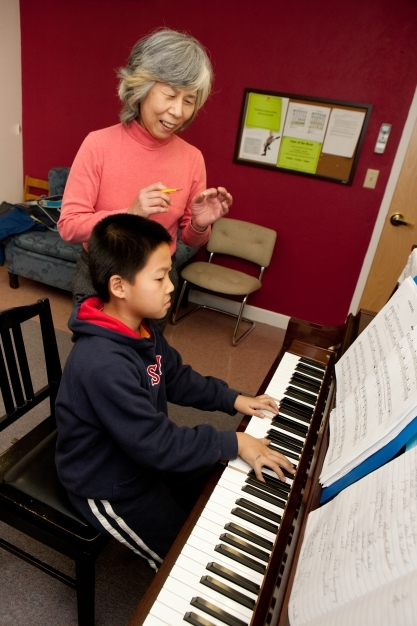Strive to help students become thoughtful, independent musicians.
While weekly lessons are an essential tool for musical growth, it’s what happens between those lessons that propel a student to the next level of mastery.
“Do not fear mistakes. There are none.“
~Miles Davis
Positive Practice—Practicing needs to be part of your daily routine, and it needs to be an activity you enjoy!
Creating a special space for practice, and entering each session with a positive attitude can go a long way.
Let’s face it, we all have busy schedules, and so do our kids. But we make time for what we think is important and the activities we enjoy. If you or your child participates in music lessons, we know you value music education and understand its myriad of benefits.
To get the most out of music lessons, you need to make a practice routine. Here are some actions you can take to make practicing a regularly occurring activity that is both enjoyable and productive.
Specific Time—Carve out a particular time for practice. Ideally, this is around the same time each day. It should also be a time when you are alert and energetic, since passive practice can do more harm than good. Remember, even though you have set aside a specific block of time for practicing, only use as much of that time as feels productive.
Specific Place—Designate a specific place in your home for practice. This area should be free of distractions and well-stocked with everything you need to learn and rehearse music: a pencil, eraser, metronome, tuner, rosin, or extra reeds are just a few examples. Make sure to turn off your cell phone and any other electronic devices that might vie for your attention.
Now that you have a set practice time and place, think about how you approach and begin practice sessions:
Remember that you like your instrument and that music is fun! Practicing is challenging, but noticing improvements will build confidence and make practice sessions more enjoyable.
Deliberate Practice and Goal Setting
You’ve established a routine where you practice every day. But do you remember what you accomplished in your practice session yesterday?
We all have activities that we go through on autopilot, but practicing your instrument shouldn’t be one of them.
To improve in any activity, you have to know what you are working towards and what you need to improve to reach your ultimate goal. If you spend practice time just playing each song from start to finish, you will not progress very far. But, sometimes, it can be hard to figure out exactly what goals you are working towards.
That is why goal pyramids can be a useful tool. At the top of the chart, you write your ultimate goal, and below it, you outline all of the steps you have to go through to achieve that goal.
Taking manageable steps towards a goal will make the end-goal appear and therefore become more attainable! Ask your teacher to help you come up with a goal chart for a specific goal. Use a calendar to outline deadlines for each step.
Helping Young Musicians Practice
Helping young ones learn a new skill takes a special balance of patience and encouragement. 
It can be extra challenging if you do not possess the skill you’re trying to teach! But never fear, here are some useful tips.
Sit in on your child’s lessons so that you know what her teacher wants her to work on and how. Keep a notebook so that her teacher can write comments and tips.
Be present when your child practices. Help her when she makes mistakes if you can, or refer to the notebook for help.
Always remain calm and positive. Point out any improvements you notice, no matter how small. Encourage creativity!
Try putting all the tasks that need to be accomplished before the next lesson on separate note cards. Place the note cards in a bowl and have your child pick out three to work on each session. This allows her to feel some autonomy!
Reward milestones. You could give a sticker every time your student masters a passage, memorizes a piece, etc. After collecting 10 stickers, reward with a concert (maybe a virtual one) or another fun activity.
As a parent, of course, you want to facilitate your child’s musical growth, but you don’t want to push them too hard, right?
Use some of these great pointers from How Do You Encourage Your Kid Without Being a Crazy Stage Parent? by Anastasia Tsioulcas, written in the NPR blog Deceptive Cadence:
Make the Plan

How do you decide what to practice in each session?
Set goals and make a plan of how you’re going to achieve them!
Resources:
From The Top, www.fromthetop.org, NPR Radio Program and PBS Television Program—
The Bulletproof Musician, www.bulletproofmusician.com, Blog by Dr. Noa Kageyama.
How to Get Your Child to Practice…Without Resorting to Violence!, by Cynthia V. Richards, Advance Publications, 1985.
American Suzuki Journal, http://SuzukiAssociation.org/news/journal/
Deceptive Cadence, NPR Blog, http://www.npr.org/blogs/deceptivecadence/
Back To Top